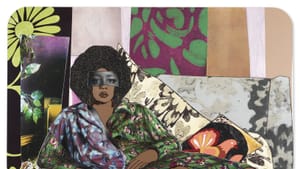Stay in the Loop
BSR publishes on a weekly schedule, with an email newsletter every Wednesday and Thursday morning. There’s no paywall, and subscribing is always free.
A sparkling philosophy of love
The Barnes Foundation presents Mickalene Thomas: All About Love

With an exhibition titled All About Love, there are questions. What kind of love? How will art deliver that love? Will I love the art? At Mickalene Thomas’s current Barnes exhibition, chances are good you may just love it—or at least like it. The special exhibition galleries host a party for your eyes.
Thomas was born in 1971 in Camden and grew up in New Jersey. She studied painting at Yale and is openly gay. Her subject matter is exclusively Black women who serve as muses: mothers, friends, lovers. Women are frequently depicted as odalisques in repose, but there are also wrestlers, erotica, portraits, and landscapes, many incorporating photographic collage. Thomas focuses not only on sexual identity but also fashion and power by creating elaborate works embellished with popping colors and sparkling surfaces that amplify a wow factor. The spaces that frame her figures evoke the vintage interiors of her childhood home with an exuberant use of patterns emphasized by hard-edge collage cutouts.
Theories of love
So, what about love? The exhibition title refers to the bell hooks text All About Love, which postulates an ethic of love as an intentional act. Along similar lines, the French philosopher Jean-Luc Nancy describes love as the act of thinking as opposed to romance or an ideal. He claimed all love equivalent, whether erotic, familial, or platonic. I considered these theories as I looked at—and thought about—the artworks, which include mixed-media paintings, photography, video, neon, and furniture.
Affirming queer existence with the female gaze
Thomas thinks a lot about women, painting imagined spaces that are outside of a patriarchal-hetero world. The show’s first section, titled Afro Goddesses, displays Whatever You Want, a large portrait of former lover Maya wearing an unbuttoned blouse and panties, seated on a floral-printed couch, leaning into the picture plane. The work shimmers literally and figuratively. Maya’s gaze holds lusty desire; her breast invites the beloved’s touch. Thomas based the painting on a photograph taken when the couple lived together in Brooklyn; it conjures up the intense passion they once shared. Her images are an affirmation of her queer existence via the female gaze.
A mark of Thomas’s signature mixed-media style is her use of rhinestones alluding to Indigenous art traditions and Haitian Vodou art. Many mixed-media paintings are profusely embellished with these little stones, refracting light that creates textured, iridescent, sensually seductive surfaces.
Eartha Kitt meets Manet
The five galleries of All About Love are welcoming to visitors. In the corner of the third section, Me as Muse, a multi-video installation of the same title beckons the viewer to spend time on a soft bench watching a dozen screens framed within a towering wall collage of a black-and-white forest surrounded by copious pots of fresh greenery. The work features audio of singer and civil-rights advocate Eartha Kitt talking about her experiences of racism while images of Thomas’s own nude body are juxtaposed with archetypes of bodies in history.
Thomas’s paintings frequently reference the old European masters but with two slants. First, compositions of figures are often appropriated from the art historical canon, such as the nod to Manet’s infamous Luncheon in the Grass. Rather than a nude woman and two clothed men, Thomas reimagines the scene with three fashionably dressed women. Titled Le Dejeuner sur l’herbe: Les trois femmes noires, the piece’s monumentality rivals history or religious paintings. By citing Manet and supersizing the work, Thomas claims a space previously denied Black and female artists. Secondly, Manet was a radical artist in his time, so Thomas pays an obvious homage to the tradition of bucking the system.
Thinking of Black women
Curator Renée Mussai gave thought to how the audience will move through the exhibition. An installation in the final section, Exuberant Assemblages, includes an unexpectedly inviting space where the audience can pause and take a seat on cheerful Thomas-designed ottomans and flooring amongst plants and books encircled by paintings and photographs. There, the visitor can contemplate Thomas’s vision.
The exhibition holds up a philosophy of love as thinking. Thomas is thinking of Black women in a way not typically encountered in conventional museum exhibits; her work displays beauty outside classical white-centric standards. Yet—like much of art history—her representations of women are highly idealized and, in some ways, subscribe to the very canon she critiques. Are there alternative ways to represent beauty? Can the beautiful be unfashionable, lack makeup, or be flawed? What would imperfect beauty look like? These are worthy questions to take away from this show.
What, When, Where
Mickalene Thomas: All About Love. $5-$30. Through January 12, 2025, at the Barnes Foundation, 2025 Benjamin Franklin Parkway, Philadelphia. (215) 278-7000 or barnesfoundation.org.
Accessibility
The Barnes is accessible to standard-size wheelchairs with designated parking for visitors with disabilities. Assistive listening devices are available and trained service animals are welcome; complimentary admission for paid personal care assistants and ACCESS/EBT cardholders, including those receiving Medical Assistance. Check the Barnes website for more accessibility information.
Sign up for our newsletter
All of the week's new articles, all in one place. Sign up for the free weekly BSR newsletters, and don't miss a conversation.

 K.A. McFadden
K.A. McFadden